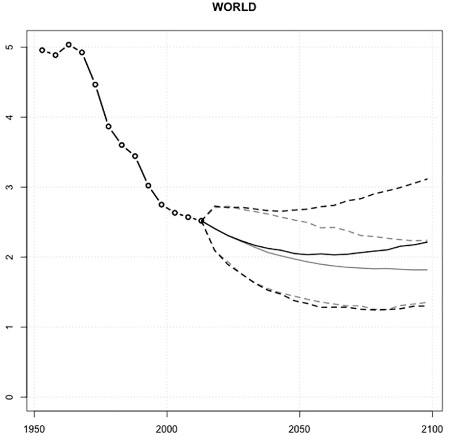How Long Will Population Fall?
Many, including my colleague Bryan Caplan, are confident that the widely forecasted world population fall based on fertility trends won’t last long, because: selection.
Many papers that make this point. For example, a 2019 Evolution and Human Behavior paper is titled “The heritability of fertility makes world population stabilization unlikely in the foreseeable future.” It assumes that world fertility soon stops declining on average at a near replacement level, except that it has a heritability of 0.3 in 30yr generations. It finds that world fertility starts to rise again ~2060, and by 2100 rises to 2.21 instead of 1.82 without heritability.
Another set of papers cautions that, sans heritability, fertility may continue to decline to far below replacement levels, and that selection effects may not be strong enough to counter such culturally-induced decline. For example, a 2022 Demography paper titled “Intergenerational Transmission Is Not Sufficient for Positive Long-Term Population Growth.”
I find it suspicious that though we didn’t see such selection effects over the many centuries decline of the Ancient Greek and Roman empires, nor in other ancient empires, nor over the last few centuries of declining fertility, we are just now about to see it kick in strong enough to reverse fertility decline.
However, I admit this is possible. And if it happened, it would in fact be a net good thing, lowering damage from declining population, economy, innovation, and liberality.
But I think it is also important to notice that this fertility fall fix, though good, does not do much to solve the deeper underlying problem of maladaptive cultural change. (Nor would most other ways to increase fertility.) Nor, by themselves, would human-level AI, colonizing other stars, or even our being replaced by the Amish or Haredim. Such a replacement may reset culture to a healthier place, but then we expect it to drift badly again, unless they do better than we have at limiting change, or increasing cultural variety or selection.
Thus we should expect to see a continued decline in the quality of our cultural norms, values, and status markers. The world will just slowly get worse at dealing with key life issues. Courtesy of ChatGPT, here are some cultural dimensions where the world will likely get worse:
Individualism vs. Collectivism, Power Distance, Uncertainty Avoidance, Masculinity vs. Femininity, Long-term vs. Short-term Orientation, Indulgence vs. Restraint, High-context vs. Low-context Communication, Hierarchy vs. Egalitarianism, Achievement vs. Relationship Orientation, Monochronic vs. Polychronic Time Orientation, Control over Nature vs. Harmony with Nature, Work Ethic, Social Responsibility, Religious Values, Family Orientation, Gender Roles, Age Respect, Modesty vs. Assertiveness, Hospitality, Face-saving.
This shows just how important, but crazy hard it is to fix cultural drift.
Added 23May: See thoughtful commentary on this topic by Lyman Stone.



In the 2019 article that you cite here, we make the point that heritability needs to be taken into account in future population projections. UN predictions are based on the built-in assumption that fertility will move below replacement level and, therefore, that global population will decline. We made the point that the heritability of fertility should be taken into account as a force acting against this decline. Your question about whether fertility will rebound above replacement level or not as a consequence is fair. More research should be conducted on the interplay between the cultural dynamics that may nudge fertility downward and the mechanical effect of the heritability of fertility that pushes in the other direction.
Note that the key challenge for cultural explanations of long term decline is to explain how cultural dynamics can counteract the cumulative effect of heritability of fertility over time. Your argument about past episodes of decline is, in that light, interesting.
An important element of fixing fertility falls: https://ishayirashashem.substack.com/p/look-at-cute-babies